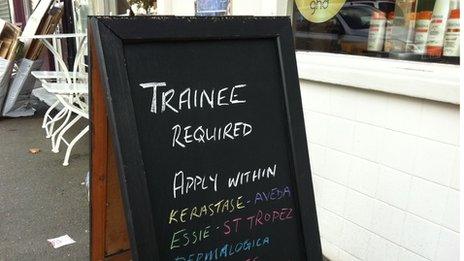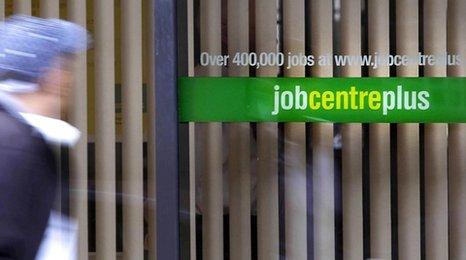Big firms warn young jobless rate 'to rise further'
- Published

Record youth unemployment is set to rise even further this autumn, a survey of the UK's biggest companies suggests.
Two thirds of those taking part said the jobs market would get worse for young workers before it recovered.
27 of the 50 largest employers in the UK completed a Newsbeat survey about the economy and jobs.
Asked what policy would best reduce youth unemployment, almost half said the government needed to do more to train up young jobseekers.
Most said too many young people were leaving school, college or university without the basic skills they needed to find work, especially in subjects like maths and English.
One large, international firm said young applicants lacked "basic presentation and communication skills as well as simple budgeting".
Another said: "Young people have unrealistic expectations of the work that they will be doing and this is made worse by the lack of skills coming out of schools."
The latest official figures show that almost a million 16 to 24-year-olds are now looking for work, the highest number since records began in 1992.
Record unemployment
On paper teenagers are performing better than ever before at school and college.
This year's GCSE results were the highest on record with seven out of 10 students awarded a grade C or above.
But more than half of the firms which completed the survey said the education system was not properly training young workers for a job at their organisation.
When asked to name the biggest single obstacle to hiring more young people, the most common answer was a lack of basic skills followed by inexperience.
Nine out of 10 companies said there needs to be a greater focus on practical, hands-on training in school and college to get more teenagers straight into work.
Susan Anderson, director of skills policy at the Confederation of British Industry which represents big companies, said: "Too many young people are leaving school without meeting the basic levels of skills in maths and English which are fundamental for work.
"Employers don't expect young people to leave school 'job ready' but they do need to have these essential foundation skills on which they can build throughout their careers."
Technical Colleges
The government said employers were right to raise concerns over basic skills.
It has just approved a batch of new University Technical Colleges (UTCs) across England to teach core subjects like English and maths alongside hands-on practical skills.
BBC News Q&A: University technical colleges
The centres are aimed at teenagers from 14 to 19 years old and specialise in areas like engineering, science technologies and health care.
The first two are already open, in Staffordshire and Walsall, with another 16 set to open over the next few years.
A typical UTC day starts at 08.30am and finishes at 5.30pm, more like a normal working day.
Colleges also have greater freedom over what they teach and are supported by local firms and universities.
Some teaching unions have criticised the plans, saying UTCs will force students to pick a technical education at just 13 years old, cutting off more academic options.
- Published17 October 2011

- Published16 November 2011

- Published12 October 2011
